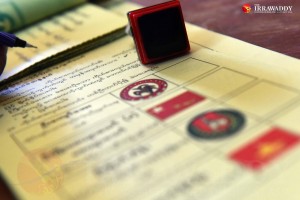The Failure of the Union Election Commission – 2015 Elections Edition
By Burma Partnership • November 7, 2015 On 4 November, Human Rights Watch (HRW) released a briefing on the fundamental flaws of Burma’s 2015 elections. Among numerous shortcomings, the statement highlighted the unapologetically biased nature of the Union Election Commission (UEC); an electoral body that should encourage the elections to be democratic – not influence them. Unfortunately, as HRW points out, the UEC is led be a Chairman with a clear affinity for the Union Solidarity and Development Party (USDP) and whose commission members are appointed – or removed – directly by the authority of Burma’s President.
On 4 November, Human Rights Watch (HRW) released a briefing on the fundamental flaws of Burma’s 2015 elections. Among numerous shortcomings, the statement highlighted the unapologetically biased nature of the Union Election Commission (UEC); an electoral body that should encourage the elections to be democratic – not influence them. Unfortunately, as HRW points out, the UEC is led be a Chairman with a clear affinity for the Union Solidarity and Development Party (USDP) and whose commission members are appointed – or removed – directly by the authority of Burma’s President.
HRW’s statement also cites the lack of a formal complaint mechanism and a needlessly broad mandate as features that threaten the legitimacy of the UEC. A report from the Carter Center also documents how the UEC suffers from an inherent lack of transparency, in everything from the organization’s regular decision-making process to the handling of voting cancellations based on “security” concerns.
The UEC, after all, was formed with a mandate to “enable the holding of elections to the first Hluttaw [Parliament] and to supervise the political parties.” Unfortunately, the numerous failings of the organization demonstrate that it is clearly not prepared to provide Burma with the necessary resources it needs to hold a “free and fair election.” For instance, the UEC has still not figured out how to properly compile a voter list that is not rife with errors or that does not exclude a vast number of eligible voters. The UEC also stumbled during the advanced voting process, running the risk of enhancing the already dire state of disenfranchisement in Burma.
On other occasions, the UEC has demonstrated a blatant disregard for international standards regarding democratic elections. The decision to ban any criticism from political parties against the 2008 Constitution and the Burma Army is one particular example of the UEC overstepping its responsibilities, while clearly demonstrating its own political allegiances. The muzzling and control of media coverage during the 2015 elections is yet another concern. Last year, the UEC demonstrated an attempt to influence politics by condemning Daw Aung San Suu Kyi’s platform surrounding constitutional amendment.
The importance of a legitimate, credible, and effective election commission cannot be understated. Considering the UEC’s shortcomings, 8 November could see a repeat of the fraudulent 2010 elections, including all of the same issues regarding voter coercion, bribery, and ballot tampering. Instead, the UEC should implement its actual mandate and supervise the elections to ensure they are transparent, unbiased, and ultimately representative of the desires of the people of Burma.
Realistically, the UEC has no time at this point – or more importantly the political will – to reverse its shortcomings and become an effective and credible electoral commission. The onus of ensuring a democratic election will ultimately fall upon election observers, including the European Union, the United States’ Carter Center, and local observers. It is therefore important that these election observers make appropriate efforts to understand and realize the shortcomings and biases of the UEC in order to accurately report on any flaws, undemocratic behavior and fraudulent proceedings during the pre-election period, on election day itself, and the post-election period. There should be an accurate report, analyzed with international human rights standards, on how peoples’ political rights to both run and vote in this election have been violated. When the UEC falls short of its obligations and responsibilities, the international community, through its election observation missions, must be prepared to respond without any reservation to their current engagement with the Burma Government, and address the issues on the ground in a manner that reflects the reality faced by the people of Burma.
Tags: Burma PartnershipThis post is in: Blog
Related PostsBurma Partnership Celebrates Continuing Regional Solidarity for Burma and Embraces the Work Ahead for Progressive Voice
Burma Army Displays Blatant Disregard for 21st Century Panglong Peace Process
Ann Din Coal Power Plant: Local Movement and Action to Preserve and Protect Natural Resources and Land: Mon IDP Report Case Study #4
Latest Human Rights Abuse Case Demonstrates Urgent Need to Reform the Myanmar National Human Rights Commission
Human Rights Far From Guaranteed as US Sanctions on Burma Are Removed









 All posts
All posts